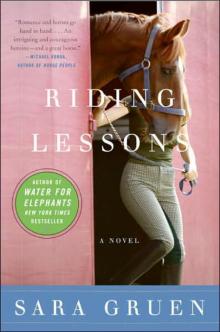- Home
- Sara Gruen
Riding Lessons Page 23
Riding Lessons Read online
Page 23
I never expected him to agree to it. I was making a statement. I wanted him to know that the price for going off with Sonja was to walk away with nothing but the shirt on his back. Not for one minute did it occur to me that he'd view that as an equitable trade.
The next afternoon, I approach my dear old car with needless trepidation: it starts without protest, despite being abandoned for months. Grateful, and fond almost to the point of tears, I back out of the garage and head to Carole's office.
I'm already beginning to regret my choice of outfit. Days don't come any hotter than this, but I've chosen a business suit--a power suit, as we would have said in the eighties--in eggplant crepe with big padded shoulders. I want to impart a sense of power. I want to appear in control.
Carole's office is in an older part of town, established and heavily treed. It's mostly residential, so the parking lot is tiny, and accessible only by a narrow gravel driveway that runs beside the house.
"Hi. May I help you?" asks the receptionist when I walk through the door.
"I'm here to see Carole. I have an appointment at two forty-five."
"Your name?"
"Annemarie Zimmer. Aldrich," I add quickly. "Annemarie Aldrich." For the next hour, maybe. Then I really will be Annemarie Zimmer again.
The receptionist seems to think nothing of my name waffling. She calls Carole.
"Your two forty-five is here. Uh-huh. Uh-huh." She picks up a pen and makes a tick mark on a ledger. Then she hangs up.
"Carole's ready for you. Do you know the way?"
"Yes," I say. "I've been here before."
Despite the receptionist's call, Carole's door is closed. I knock.
"Ah, Annemarie. Come in, come in," says Carole, opening the door and smiling broadly. She takes my hand, shakes it vigorously, and then uses it to pull me into the room. She steers me toward a chair and then takes a seat behind her desk. Everything in this room is in miniature, including the woman. I think all of it was built at three-quarter scale.
"This should be pretty straightforward," she says, leaning forward in a way that's intended to put me at ease. If she were a man, she'd unbutton her cuffs and roll up her sleeves. "We've filed signed copies of the agreement with the court, so unless the judge finds something totally out of line, it should just go through."
"What do you mean, totally out of line?"
"The usual distribution is somewhere between fifty and fifty-five percent, usually in favor of the wife, so this is not wildly out of line. Besides, he makes a lot more money than you, and you're not asking for support."
"No, I'm not," I say quickly. "I want nothing more to do with him."
She glances at her watch. "I'll have Nicole call a cab. Oh, one last thing. When the judge asks how long you've been separated, say two years."
"But we haven't been."
"Do you want to get divorced?" she asks.
"Yes, of course."
"Then say you've been separated two years."
Fifteen minutes later, Carole and I arrive at the courthouse. As she pays the driver, I look over at the building.
Roger and Sonja are standing in front of the courthouse steps. She has her back to me, but who else could it be? She's dressed in a pale yellow sundress, her tanned, trim arms and legs exposed. Her hair tumbles down her back, a mass of loose chestnut curls. Then she rises on her tiptoes, exposing the bottoms of her flat-soled shoes. Roger leans forward and envelops her in his arms. His eyes close, and he presses his face into her hair with a look of wonder.
I turn my head so violently my neck cracks. I feel as though someone has just driven a machete into my chest.
"Are you ready?" says Carole from beside me.
I turn to her. "Pardon?"
She's looking at me, her hand on the door handle.
"Uh, yeah," I say.
"Let's go then."
I close my eyes, breathe deeply, and get out.
When I look back, Roger has mounted the stairs and is passing through the revolving doors. Sonja is walking away, disappearing into the crowd with her diaphanous yellow dress swirling around her calves. She carries herself like an African queen, proud and tall, although in reality she is Caucasian and petite. She is a center of energy, a nucleus of sunshine in a sea of drab business suits. I can't help myself; I stare at the monochromatic crowd until the last flashes of yellow disappear.
When I turn back, Carole is looking at me.
"Are you okay?" she asks.
"I'm fine."
"Courage, Annemarie. It won't be long now," she says, laying a hand on my elbow. I let her guide me up the stairs.
At least Sonja won't be at the hearing. I'm not sure I could stand that. I'm not sure I can even stand Roger being at the hearing, because at this moment, I hate him more than I've ever hated anything in my entire life.
I'm both officially divorced and officially drunk.
The hearing went just as Carole said it would--the judge asked a couple of questions, including how long we've been separated, looked over the agreement, and declared us divorced.
I hot-tailed it from the courtroom before Carole even had a chance to return to her seat, a retreat that almost instantly threatened to turn ignominious. In my haste to get out of there, I had forgotten that we came over together in a cab. I tripped coming down the stairs of the courthouse, shook off the kind man who offered to catch me, and then, finding no taxis at the curb, walked three blocks away before trying to hail one. When a cab finally pulled over, I just prayed that I'd get back to my car before Carole returned to her office. I didn't want to face her, or anyone else.
On the way home, I stopped for a bottle of gewurztraminer, and then on second thought, bought two. There wasn't any point in buying food. Just the thought of Roger's delicate little flower with her slim brown calves makes me want to barf.
I'm only just starting to recover now, sitting in my sweltering living room (no energy to turn on the air-conditioning), and nursing my fourth glass of wine.
I was totally unprepared for this. It's not that I expected to be completely unaffected--after all, this life that we built, whether on love or convenience or habit--whatever, because that part simply doesn't matter anymore--was just dissolved. It hit me when I saw the piece of paper tacked up beside the courtroom door: WONG VS WONG, SCHWARZ VS SCHWARZ, LIEBERMAN VS LIEBERMAN. And, of course, ALDRICH VS ALDRICH.
It moved me to tears, and I don't know why. It's not as though I want to recreate my life with Roger, so why do I feel so empty?
It's because of what I saw today. It was the way they touched, the way their bodies inclined toward each other, bodies so familiar each anticipates how the other will move. The tenderness with which Roger cradled the back of her head in his hand, the look of wonder on his face. The way she stood on her tiptoes and pressed her body to his.
Roger and I never shared that kind of passion. I never stood on tiptoe and pressed my body to his. We just never could make it work, and I have no idea why. In fact, I didn't even know what an orgasm was until the year before I conceived Eva, and that was while Roger was away on business. That was just me, a half bottle of wine, and a good bit of determination.
I stare glumly at the bottle and then reach for it, tipping the last of the gewurztraminer into my glass. Then I hold it there, waiting in vain for more to come out.
I lean toward the coffee table. There's a watermark on the wood, and I try to set the bottle back down on it, but my vision is swimming a little. As it makes contact just shy of the watermark, the doorbell rings. I freeze.
I look down at myself. I'm still in my power suit, but am considerably rumpled. My skirt is wrinkled, my blouse untucked, and I have a large run in my stockings. I stand up and stuff the blouse back into my waistband, hitch my stockings up unceremoniously, and go through to the foyer.
I look through the window by the door, although I already know who it is.
I open the door a crack and glare at him. "What do you want?"
"May
I come in?"
I pause, hoping it's long enough to make him think I'm going to refuse, and then stand aside. I wave him in.
"I'm sorry about your father," he says, standing awkwardly. After a moment, he advances and tries to give me a hug. I shake him off.
"I tried to find you after the hearing," he says.
"I left."
He nods. "Can we sit and talk for a minute?"
I say nothing, again hoping he'll think I'm about to throw him out, and then lead the way to the living room. He follows and sits on the edge of the couch opposite me. We are separated by the coffee table. His eyes light on the empty bottle.
He looks back at my face. "I would have called, but the number's been disconnected."
"Look," I say wearily. "I'm really not in the mood for a chat. Just tell me when you're going to drop Eva off."
"That's one of the things I wanted to talk about," he says. He rubs his hands together, hands that have touched Sonja. I feel my lip curl.
"When are you going back to New Hampshire?" he asks.
"I don't know. Tomorrow or the next day."
"I thought you flew."
"I did, but I'm going to drive back."
His eyes widen. "You've been without the car this whole time?"
"Yes," I say sharply. "When are you going to drop Eva off?"
"Ah, well, we have a slight problem there."
I wait.
"She doesn't want to go back with you."
"Roger, don't do this to me. I don't need this right now."
"You may not believe me, but I've tried to talk to her--"
"Just drop her off tomorrow, okay?" I say, feeling perilously close to tears. "I'll talk with her myself."
"I can't force her, Annemarie. You know how she is."
I jump to my feet and scan the room for my purse. It's on the hall table. I stumble over to it and plunge my hand into its depths, digging for my cell phone. When I don't find it, I turn the purse upside down and dump its contents. The cell phone falls to the floor with a clatter. I lean over and pick it up.
"What's your number?" I demand.
"What are you doing?"
"I'm going to talk to Eva. I assume she's at your place. What's your number?"
"Annemarie--"
"Just tell me your goddamned number."
I stare at him. He stares back. Then he recites the number.
It rings three times before someone answers.
"Hello?" It's Sonja, not Eva. Her voice is clear and high. "Hello?" There's a pause, and then she continues, sounding worried. "Hello? Is there anybody there?"
I stand with the phone clutched to my ear, not sure what to do. Finally, I pull the phone away and switch it off.
"No answer?" asks Roger.
"No," I say, my eyes fixed on the wallpaper.
Another agonizing silence fills the room.
"When is the funeral?" Roger finally says.
I close my eyes and shake my head.
"I'll talk to her," Roger says. "Why don't you head home to be with your mother, and when I get Eva sorted out, I'll fly her out to you."
I somehow manage to nod.
After a moment of silence, Roger says, "There's something else I need to tell you."
"What?"
He's quiet for a long time, and after the first few seconds, I get scared. Is he sick? Is he dying? Does he have a brain tumor? I've read that such things can make you act out of character--could this be the entire reason for his behavior, for his leaving me in the first place?
I look over at him. His dark brown eyes are staring directly into mine. "Sonja and I are expecting a baby in January," he says.
I hear him, and yet I don't. I feel like a gutted fish, as if Roger has actually held onto the back of my collar with one hand and eviscerated me with the other. There is nothing more painful he could have done than conceive a child with this woman, and he knows this better than anyone in the world, because he knows I cannot have more children. And then another, even more horrifying thought occurs to me--what if he left me because of that?
"Annemarie?"
"You bastard."
"I wanted you to hear it from me."
I stare at the top of his head, imagining how it would feel to sink a hatchet into it.
"How could you do this to me?"
He says nothing.
"Unless she trapped you. Is that it? Did she spring this on you?"
"It was planned."
"You're a bastard. Did you know that?"
"I'm sorry, Annemarie."
"Just leave, okay? Just get out."
He sits contemplating his hands for a moment, and then gets up and walks to the door. He opens it and stands staring outside with one hand on its edge. Then he looks back at me. "I'm sorry, Annemarie. About all of this. I know you hate me, and you're entitled, but it was never my intention to hurt you. I always loved you. I always, always loved you. Maybe more than was good for me."
"What the hell is that supposed to mean?"
"It means that I always knew I loved you more. There was never any question about it. I knew it when we got married, but I guess I thought that eventually..." He shakes his head. "I really did try, Annemarie."
He pulls the door shut behind him, and I'm left staring at the wood. A moment later, I hear a car door slam, and then the sound of the motor.
I have an overwhelming need to get out of here, but I can't. I've already had too much to drink. Besides, there's still the other bottle to get through.
I settle on the couch for the night, not wanting anything to do with the bed. Approximately halfway through the second bottle and a rerun of Jackass, I have come to an astonishing conclusion: Roger is right.
I was always aware that he loved me more than I loved him, but that seemed natural. In my mind and in my heart, Roger was always just the supporting act.
Why? Why did I think that? Because I'm better than him? Because I am special and intrinsically entitled to his devotion?
As shameful as it is to admit, that's exactly what I thought. I was the colorful Annemarie, the Wunderkind, the eighteen-year-old Olympic contender. Of course, you'd think that my attitude would readjust after I no longer had any claim to fame, but it never did. I may have been special once, but I'm not anymore. I haven't been special in a long, long time.
My attention is drawn back to the television screen. The Jackass guys are on a dock, using an enormous slingshot to heave a dwarf into a lake. Disgusted, I stick my hand between the couch cushions, digging for the remote control. I encounter several coins and chunks of petrified food before my fingers finally close around the cool, smooth plastic.
With the television off, the only light in the room is coming through the windows. It's the glow of streetlights, whiter and harsher than the moon. No matter, though. I can still find the bottle.
I take a swig, not even bothering to pour it into my glass. I wonder what Roger would think of that. He always accused me of being too formal, too reserved, although I suppose that was actually a euphemism for not being passionate enough.
And the horrible thing is, I now see that he was right about that, too.
Chapter 17
I wish I were dead.
I passed out somewhere close to midnight, but woke again at three, suffering from a combination of self-hatred, room spins, and insomnia. Of course, once the sun began to rise, I could have gone to sleep. But there's no time for that. For the sake of my sanity, I have to get out of here as soon as is humanly possible.
I haul my bones up the stairs, seeking Tylenol. An eerie feeling permeates the house--it's as though it's outfitted for a ghost family. There are clothes in the drawers, medicines in the bathroom, bottles of shampoo on the edge of the tub. I'll have to hire somebody to come in and do the packing, because I don't think I'm capable. It would feel too much like an autopsy.
There is no Tylenol, but at least there's aspirin. I'm so parched I drink four glasses of water, and promptly throw up in the
sink. I take a couple of aspirin and sit on the edge of the bathtub, waiting for my stomach to settle.
After a while, I clean the sink and set about to make the house look like I haven't been here.
It doesn't take much. I fold up Roger's grandmother's afghan and replace it in the cedar chest, wash and dry my wineglass, and then spread the realtor's pamphlets into a pretty fan on the hall table. Then, when I'm pretty sure no one's looking, I sneak out back and drop the two empty bottles in the neighbor's recycle bin. I hope neither of them is an alcoholic. Otherwise, I might be getting someone into a heap of trouble.
I pause before leaving, because the moment feels loaded. I feel like I ought to do something ceremonial, like a farewell tour. And maybe if I weren't so hung over I would. But I am, so I grab my suitcase and Harriet's dog bed and hit the road.
The sun is merciless, beginning its assault the second I back out of the garage. When Eva was little, she used to say the sun was shouting at her. Today, it's positively screaming. I squint to the point of blindness and grope in my purse for sunglasses. I locate a pair in the glove box, but not before my brain is pounding as though it will explode. I almost wish it would.
I can't even feel sorry for myself. I drank more last night than I ever have in my life. Not that I wasn't provoked.
My God, if Roger really felt that way, why didn't he say something years ago? I'm aware that plenty of blame falls my direction, but what about him? He didn't even give me a chance to make it right. He has to take some of the blame just for staying silent, because by doing so he made it easy for me to take him for granted.
The more I think about it, the more I resent Roger's implication that he is the only one who tried. I tried extremely hard--at everything--even if I didn't always succeed.
When we first married, I had visions of being the perfect housewife. When you're nineteen, there's something romantic and appealing about the thought of being the lovely wife making a lovely home. Unfortunately, only the thought was appealing, and I grew bored instantly. Roger suggested I go to college, but I refused. It's not like he tried to force me into anything. He would have been perfectly happy for me to stay at home if I weren't so utterly miserable. But I was. I had him stumped. I didn't want to be home, and I didn't want to do anything else. He couldn't figure out what I wanted, and neither could I.

 Ape House
Ape House Water for Elephants
Water for Elephants Riding Lessons
Riding Lessons At the Water's Edge
At the Water's Edge